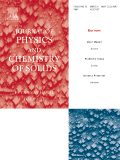
JOURNAL OF PHYSICS AND CHEMISTRY OF SOLIDS
metrics 2024
Exploring the Interplay of Physics and Chemistry
Introduction
JOURNAL OF PHYSICS AND CHEMISTRY OF SOLIDS, published by Pergamon-Elsevier Science Ltd, is a distinguished international journal that has been at the forefront of disseminating cutting-edge research in the fields of physics, chemistry, and materials science since its inception in 1956. This journal, which is recognized for its high impact in the Q2 category across multiple subjects—including Chemistry (miscellaneous), Condensed Matter Physics, and Materials Science—serves as a vital platform for researchers, professionals, and students to engage with significant advances in solid-state physics and chemistry. With Scopus rankings placing it in the top 15% of its field across various domains, the journal plays a crucial role in shaping the scientific dialogue surrounding materials properties, synthesis, and applications. Although it does not currently offer open access options, the presented research is widely recognized for its quality and relevance, ensuring that published works contribute meaningfully to ongoing scholarly discussions.
Metrics 2024
 0.70
0.70 4.30
4.30 3.70
3.70 121
121Metrics History
Rank 2024
Scopus
IF (Web Of Science)
JCI (Web Of Science)
Quartile History
Similar Journals

JOURNAL OF ELECTRONIC MATERIALS
Unveiling the Future of Materials ScienceWelcome to the Journal of Electronic Materials, a premier publication in the field of materials science. Published by Springer, this esteemed journal has been a beacon for groundbreaking research in electronic, optical, and magnetic materials since its inception in 1972. As an established resource, it boasts a commendable impact factor and categorically ranks in the second quartile (Q2) in key areas such as Condensed Matter Physics and Electrical and Electronic Engineering, as well as holding a respectable third quartile ranking in fields related to Electronic, Optical, and Magnetic Materials and Materials Chemistry. Researchers, professionals, and students can access a wealth of knowledge as we publish original articles, reviews, and cutting-edge research that push the boundaries of science and technology in these critical fields. Stay informed and engaged as we explore advancements that shape the future of electronic materials.

Nano Hybrids and Composites
Empowering Research Through Open AccessNano Hybrids and Composites, an esteemed journal published by TRANS TECH PUBLICATIONS LTD, serves as a pivotal platform for the dissemination of groundbreaking research in the field of nanotechnology and materials science. With an ISSN of 2297-3370 and E-ISSN of 2297-3400, this journal aims to provide comprehensive insights into the development and application of nano-hybrid materials and composites, exploring their innovative uses across various industries. The journal is particularly distinguished for its commitment to Open Access, enabling unrestricted access to high-quality research findings that influence both academia and industry. Researchers, professionals, and students are encouraged to contribute to and engage with the vast array of topics covered, as the journal not only enhances the scientific discourse but also fosters collaboration and advancement in this rapidly evolving field.
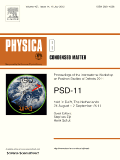
PHYSICA B-CONDENSED MATTER
Elevating Scholarship in Condensed Matter Physics and EngineeringPHYSICA B-CONDENSED MATTER, published by Elsevier, stands as a leading journal within the field of condensed matter physics, electrical and electronic engineering, as well as electronic, optical, and magnetic materials. With an impressive impact factor and a solid ranking in various Scopus categories—Q2 for 2023 in Condensed Matter Physics, Electrical and Electronic Engineering, and Electronic, Optical, and Magnetic Materials—this journal offers a vital platform for advancing research and fostering collaboration among academics and industry professionals. The scope of the journal encompasses a wide range of topics, including fundamental research findings, applications, and technological innovations in condensed matter. While it does not currently provide open access, PHYSICA B-CONDENSED MATTER is highly regarded for its rigorous peer-review process and dedication to high-quality scholarship, making it an indispensable resource for researchers, professionals, and students keen on exploring the complexities and advancements in materials science. Submissions are welcomed from a global community of scholars, contributing to an ongoing discourse in this dynamic and rapidly evolving field.
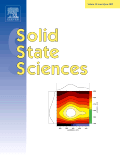
SOLID STATE SCIENCES
Transforming Ideas into Breakthroughs in ScienceSOLID STATE SCIENCES is an influential academic journal published by Elsevier, focusing on advancements in the fields of chemistry, condensed matter physics, and materials science. With an ISSN of 1293-2558 and an E-ISSN of 1873-3085, this journal has been at the forefront of disseminating innovative research since its inception in 1999 and is projected to continue until 2024. Positioned in the prestigious Q2 category in multiple disciplines for 2023, SOLID STATE SCIENCES ranks #87 in condensed matter physics, #101 in general chemistry, and #124 in general materials science within Scopus. Researchers and professionals in these fields will find this journal indispensable, offering open access options that enhance global visibility and accessibility of cutting-edge research, fostering collaboration and innovation. With its commitment to showcasing substantial contributions and novel methodologies, SOLID STATE SCIENCES plays a vital role in shaping the future of materials research.

Computational Condensed Matter
Exploring Innovative Computational Techniques in Materials ScienceComputational Condensed Matter, a reputable journal published by Elsevier, serves as a critical platform for advancing the understanding of condensed matter physics and related fields. Since its inception in 2014, the journal has become a pivotal resource for researchers and professionals dedicated to exploring electronic, optical, and magnetic materials, as well as materials chemistry and general materials science. With its current standing in the Q3 quartile across multiple categories in 2023, it ranks within the 60th percentile for Materials Science (miscellaneous) and the 54th percentile for Condensed Matter Physics in Scopus, reflecting its growing influence and relevance in the scientific community. The journal aims to publish high-quality, peer-reviewed articles that can foster innovation and collaboration in computational methods applied to condensed matter systems. Researchers interested in cutting-edge insights and methodologies will find Computational Condensed Matter to be an invaluable addition to their academic resources. For those seeking to contribute to or stay informed about the latest advancements in the field, this journal is a must-read.
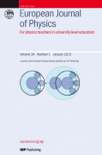
EUROPEAN JOURNAL OF PHYSICS
Advancing the Frontiers of Physics and AstronomyEuropean Journal of Physics, published by IOP Publishing Ltd, is a premier international journal serving the diverse field of physics and astronomy. With a commitment to advancing scientific knowledge since its inception in 1980, the journal provides a platform for original research articles, reviews, and topical discussions in various domains, including theoretical and experimental physics. Operating out of the United Kingdom, the journal has achieved a commendable Q2 ranking in the Physics and Astronomy (miscellaneous) category for 2023, reflecting its robust influence in the academic community, alongside a notable Scopus Rank that underscores its relevance in both the Social Sciences and General Physics and Astronomy fields. Although it does not currently offer open access, the journal's traditional publication model ensures rigorous peer review, maintaining high scholarly standards that are imperative for researchers, professionals, and students striving to stay ahead in their respective fields. Don't miss the opportunity to engage with cutting-edge research and contribute to the ongoing dialogue in physics by accessing this vital resource.
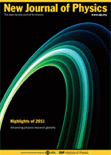
NEW JOURNAL OF PHYSICS
Transforming research into accessible knowledge for all.NEW JOURNAL OF PHYSICS, published by IOP Publishing Ltd, is a prestigious open-access journal that has been at the forefront of the physics community since its inception in 1998. With an impact factor that places it in the Q1 category of Physics and Astronomy (miscellaneous) and a commendable ranking of #49 out of 243 in the general physics and astronomy category according to Scopus, this journal is recognized for its significant contribution to advancing research in the field. The journal caters to a broad scope of topics, providing a platform for the dissemination of cutting-edge research findings and innovative theoretical explorations. Operating from the United Kingdom, it offers a truly international perspective, making its contents accessible and impactful to a global audience. With robust open-access options, the NEW JOURNAL OF PHYSICS ensures that research findings are freely available, promoting collaboration and knowledge sharing among researchers, professionals, and students alike. This commitment to accessibility, combined with its high-quality content, makes it an essential resource for anyone engaged in the physics community.
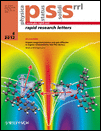
Physica Status Solidi-Rapid Research Letters
Catalyzing Innovations in Condensed Matter PhysicsPhysica Status Solidi-Rapid Research Letters is a distinguished peer-reviewed journal published by WILEY-V C H VERLAG GMBH that serves as a critical platform for the rapid dissemination of research in the domains of Condensed Matter Physics and Materials Science. Since its inception in 2007, the journal has maintained an impressive Q2 ranking in both relevant categories, underscoring its significant impact within the scientific community. With an E-ISSN of 1862-6270, it offers insightful contributions to the understanding of advanced materials and their applications, attracting a global audience of researchers, professionals, and students. Although not an open-access journal, it is recognized for its rigorous review process and high-quality publications that push the boundaries of knowledge. By encouraging the exchange of innovative ideas and findings, Physica Status Solidi-Rapid Research Letters continues to solidify its role as an essential resource in fostering scientific advancements.

Journal of Physical Chemistry Letters
Elevating Research Standards in Physical ChemistryThe Journal of Physical Chemistry Letters, published by the American Chemical Society, is a premier journal in the fields of Physical and Theoretical Chemistry, Materials Science, and Nanoscience and Nanotechnology. Since its inception in 2010, this journal has established itself as a significant platform for rapid publications of cutting-edge research that bridges various branches of chemistry, providing a critical avenue for advancing knowledge in these dynamic fields. With an impressive impact factor and a consistent ranking in the top quartile (Q1) of its categories, the journal ranks 25th out of 189 in Physical and Theoretical Chemistry and 79th out of 463 in General Materials Science according to Scopus metrics. Although it currently does not operate under an open access model, it remains an essential resource for academics seeking to disseminate their findings to a global audience. Researchers, professionals, and students alike will find invaluable insights and contributions that push the boundaries of scientific inquiry within these disciplines.
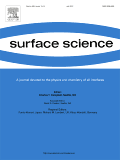
SURFACE SCIENCE
Bridging Disciplines in Condensed Matter PhysicsSURFACE SCIENCE is a prominent journal in the fields of Condensed Matter Physics, Materials Chemistry, and Surface Engineering, published by Elsevier in the Netherlands. With an ISSN of 0039-6028 and an E-ISSN of 1879-2758, the journal encompasses a wide range of research related to the physical and chemical properties of surfaces and interfaces, serving as a valuable resource for researchers, professionals, and students alike. As of 2023, it holds a Q3 ranking across multiple categories, indicating its significant contribution to its respective fields, despite room for improvement in its overall impact within the scientific community. Researchers will find that SURFACE SCIENCE provides a platform for innovative and interdisciplinary studies, making it essential for those looking to stay updated on emerging trends and technologies in surface science. While the journal is currently not open access, its reputation and robust indexing reinforce its importance in advancing scientific knowledge and fostering new discoveries.